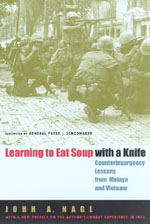The new counterinsurgency

The Economist recently ran an interesting story on the evolution of American counterinsurgency tactics to meet the demands of the current war in Iraq. Drawing on Lt. Col. John A. Nagl’s Learning to Eat Soup with a Knife: Counterinsurgency Lessons from Malaya and Vietnam the Economist piece begins by citing the history of Western counterinsurgency operations and how they obviate the need for improvements in military strategy:
Given the difficulties in Iraq and Afghanistan, American officers are relearning the history of their own interventions in Latin America and, more important, the lessons of British imperial policing. Why, American experts asked, did Britain succeed against communist revolutionaries in Malaya in the 1950s, whereas America failed to defeat the communists in Vietnam in the 1960s and 1970s?
In his 2002 book Learning to Eat Soup with a Knife, John Nagl, an American lieutenant-colonel, concluded that British soldiers were better than the Americans at learning from their mistakes. General Sir Gerald Templer, the British high commissioner in Malaya, argued that “the shooting side of the business” was only a minor part of the campaign. Coining a phrase, he suggested that the solution “lies not in pouring more troops into the jungle, but in the hearts and minds of the people.” In contrast, says Colonel Nagl, the Americans in Vietnam remained wedded to “unrestrained and uncontrolled firepower,” despite some work with small units that were deployed in border villages and civil-military reconstruction projects.
But more recently, Nagl, along with the likes of David Petraeus, has had the chance to influence American military strategy much more directly as part of the think-tank that produced The U.S. Army/Marine Corps Counterinsurgency Field Manual—one of the most important contemporary military documents on modern counterinsurgency published. Nevertheless skeptical about the progress of the war in Iraq the Economist glosses the manual in saying:
The American army and marines have produced a new counterinsurgency manual. One of its authors, General David Petraeus, is now in charge of the “surge” in Iraq. It may be too late to turn Iraq round, and Afghanistan could slide into greater violence. But the manual offers some comfort: it says counter-insurgency operations “usually begin poorly,” and the way to success is for an army to become a good “learning organization.”
But can we learn fast enough to turn around the failing war in Iraq? To find out more about the book and the changes in counterinsurgency tactics it proposes, read Nagl’s foreword and “Paradoxes of Counterinsurgency Operations” from the first chapter.
Also, Sarah Sewall, director of the Carr Center for Human Rights Policy at Harvard University, and another major contributor to the Manual, is currently taping a piece for PBS’s Charlie Rose show to discuss the book in the context of the current situation in Iraq. Check the Charlie Rose website for air times.